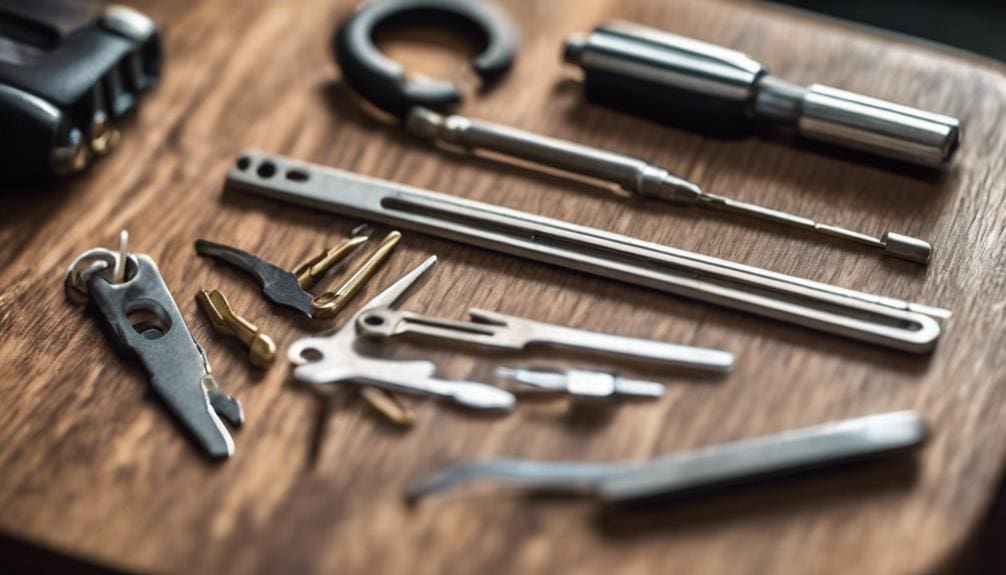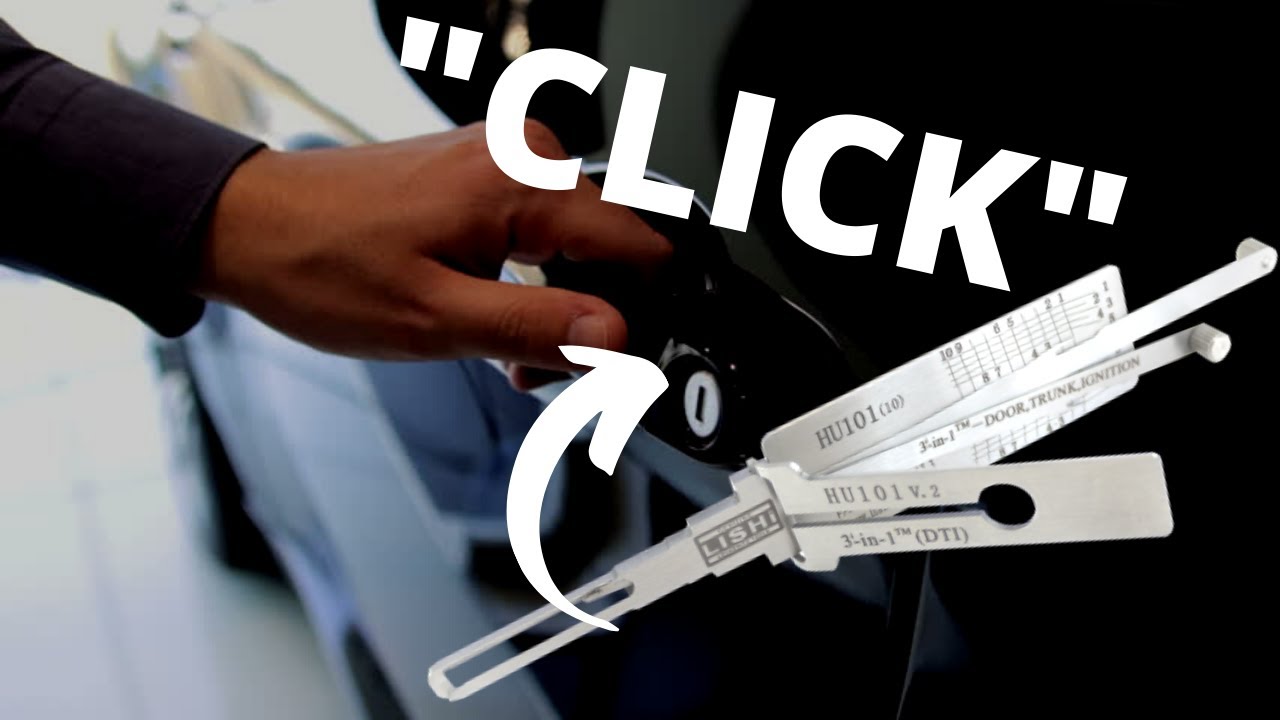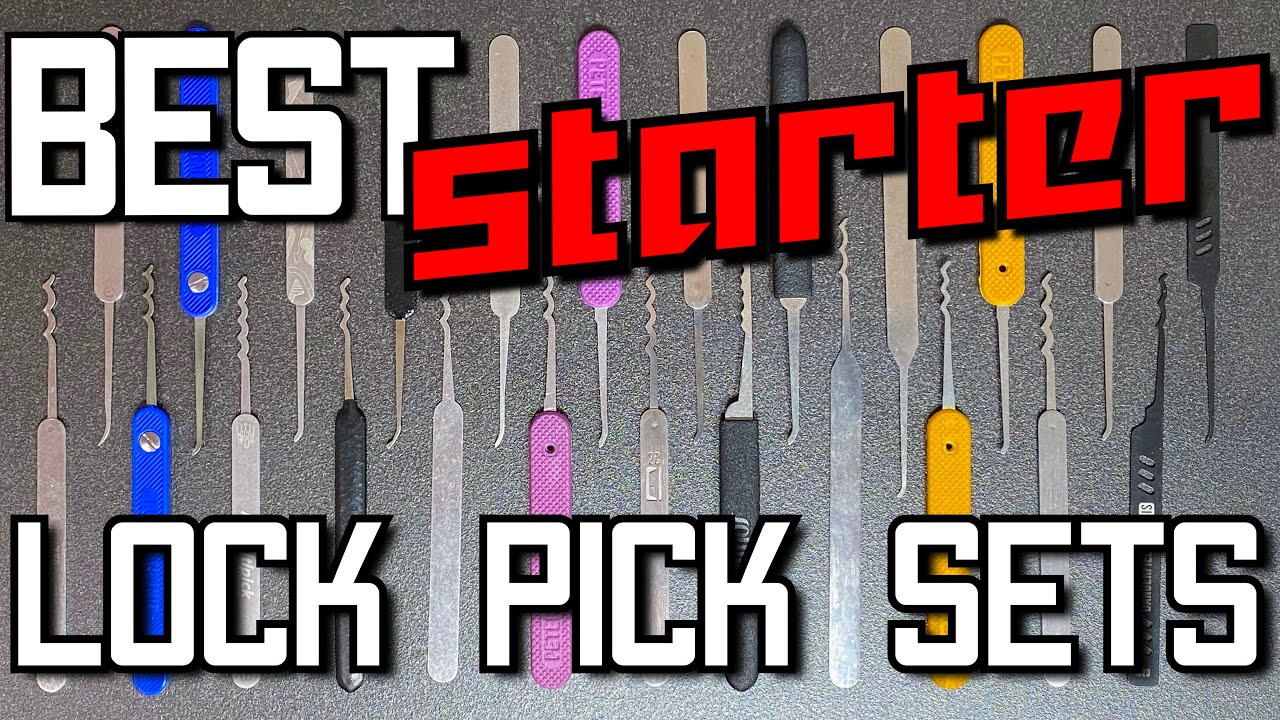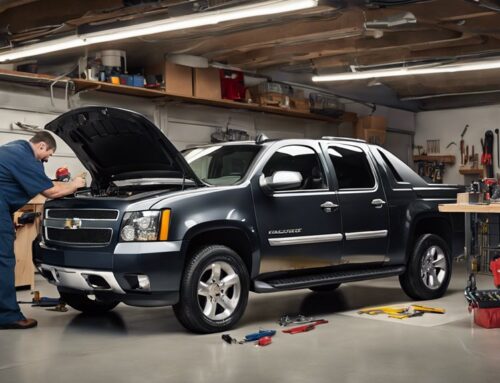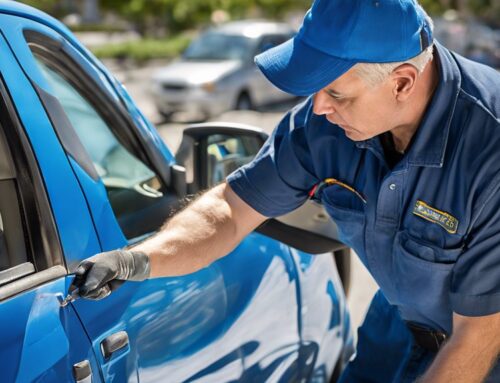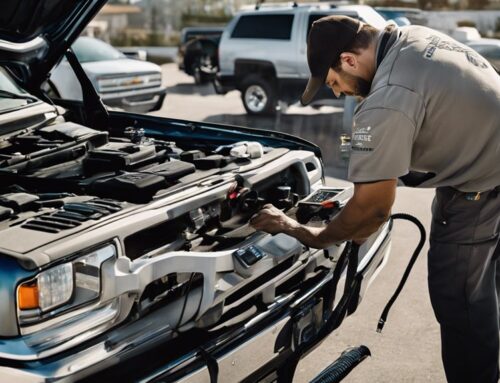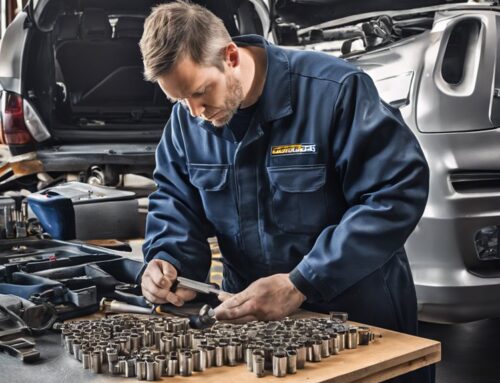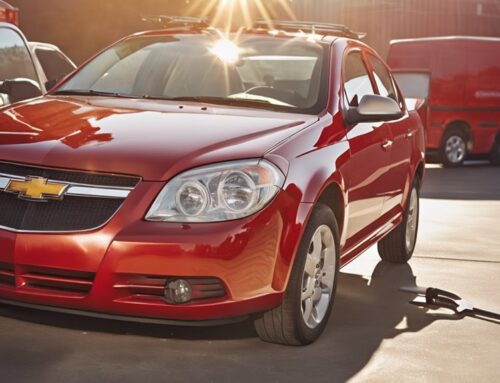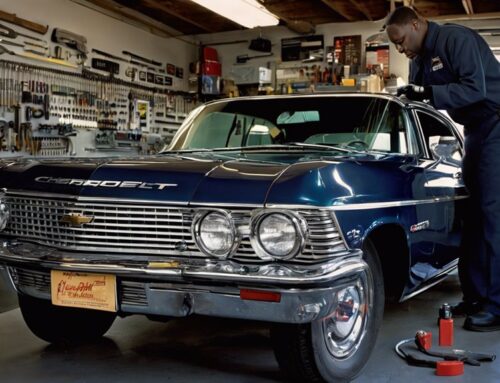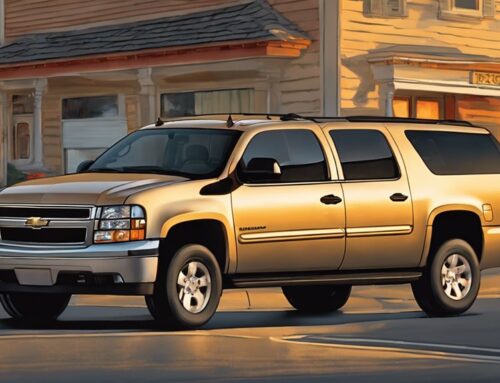To master car lock picking, start by identifying the car lock type to select the right tools. Look for sets compatible with various lock designs like the versatile Lishi 2 in 1 or specialized picks for brands like Ford and Mercedes. Prioritize professional-grade sets from reputable brands like SouthOrd and LockPickWorld, ensuring they’re made of durable materials like stainless steel. Customer reviews are valuable for insights into performance and durability. Always stay aware of legal considerations in your area. By following these steps, you’ll find the ideal auto lock pick set to enhance your lock picking skills. Continue to uncover more critical details.
Key Takeaways
- Choose sets compatible with common car lock types to ensure versatility and effectiveness.
- Evaluate customer reviews to gain insights into the performance and reliability of different tool sets.
- Opt for professional-grade tools made from durable materials like stainless steel for longevity.
- Select specialized tools for specific car brands to enhance precision and minimize lock damage.
- Ensure compliance with regional lock picking laws to avoid legal complications and ensure proper usage.
Understanding Car Lock Types
When understanding car lock types, it’s important to recognize that different makes and models employ unique locking mechanisms that require specific tools for effective lock picking. Car locks vary widely between foreign and domestic vehicles, each presenting distinct challenges. For instance, certain European cars might use complex mechanisms that aren’t found in American models. It’s important to identify the specific car lock type you’re dealing with to select the appropriate tool.
Common tools like the Goldfinger can help bypass car locks using alternative methods without direct picking. This can be particularly useful for more sophisticated car lock systems. However, for a more hands-on approach, tools like the Lishi 2 in 1 Car Lock Picks have proven effective across various car locks. They offer versatility, allowing you to tackle different lock types with precision.
Specialized picks cater to specific brands, enhancing efficiency. For example, the Ford Tibbe Lock Pick is designed specifically for Ford models, while the Mercedes Benz Inner Groove Pick is tailored for Mercedes vehicles. Understanding these tools and their applications ensures you’re well-equipped to handle a wide range of car locks, making your lock-picking endeavors more successful.
Essential Tool Selection Tips
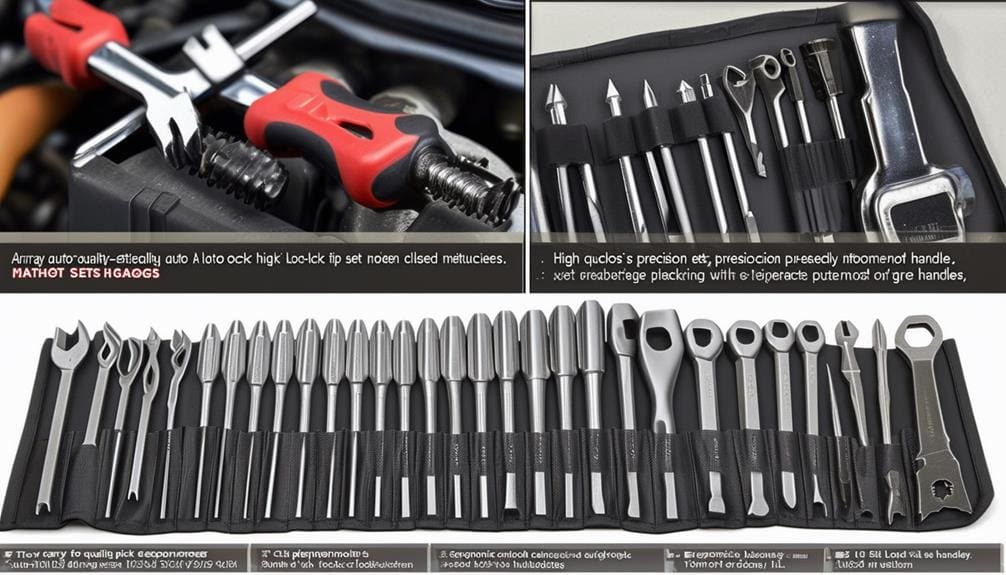
Choosing the correct car lock pick set necessitates a systematic approach to make certain you have the appropriate tools for the car locks you’ll come across. Start by considering the type of car locks you’ll be dealing with. Each lock pick set is tailored for specific lock mechanisms, so make sure the set you choose is compatible with the most common car lock types you’ll encounter, such as wafer locks or slider locks.
Opt for lock pick sets that offer versatile solutions. A good set should include tools that allow you to bypass locks using alternative methods, which can be essential when you face different lock designs. Versatility in your toolset can make a significant difference in successfully opening a variety of vehicles.
Evaluate the range of tools available. Aim for a complete set that covers the spectrum of your needs. This might include tension tools, rake picks, and hook picks. Take your time to investigate various options to find the best fit for your requirements.
For further guidance, don’t hesitate to reach out to LockPickWorld via email at hello@lockpickworld.com. They can assist you in selecting the right car lock pick set, ensuring you have a reliable and effective toolkit.
Evaluating Product Ranges
To effectively assess the wide range of lock pick sets available, start by familiarizing yourself with the reputable brands offered by LockPickWorld, such as Dangerfield, Multipick, and SouthOrd. These brands are renowned for their quality and reliability, and they provide a variety of auto lock pick sets suited for both beginners and experts.
When evaluating these products, explore customer reviews to gain insights into how well these tools perform in real-world scenarios. Look for feedback on the ease of use, durability, and success rates in picking different types of locks. Reviews will help you make an informed decision.
Consider your specific needs: Are you a novice or an experienced locksmith? Dangerfield offers inclusive sets that are beginner-friendly, while Multipick and SouthOrd are known for their professional-grade tools. By aligning your skill level with the appropriate set, you’ll maximize your efficiency.
Take advantage of LockPickWorld’s free US shipping on orders over $35 to guarantee you get the best value. Their decade-long reputation for quality and affordability means you can trust their product range. Methodically comparing these sets will lead you to the best auto lock pick set for your needs.
Specialized Lock Picks
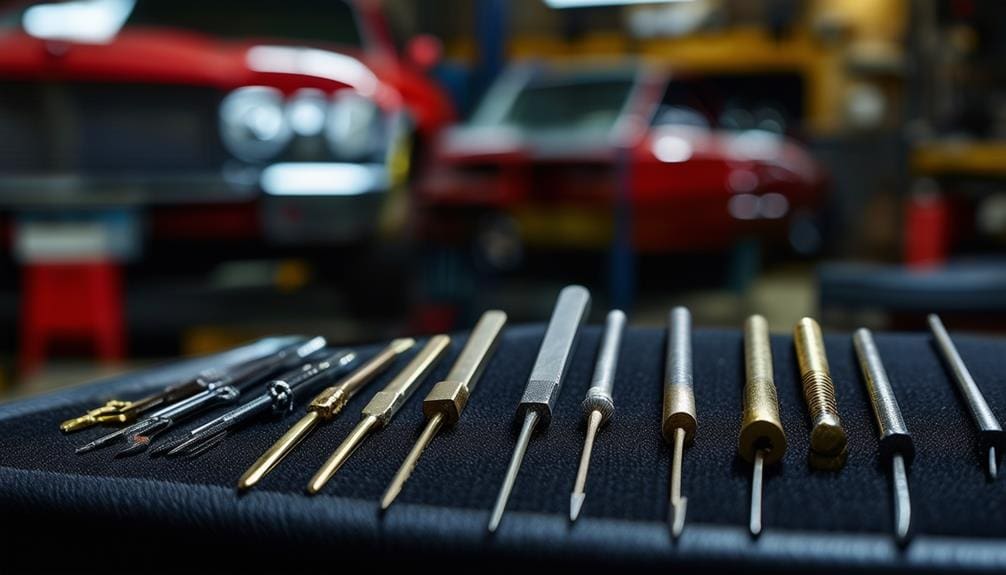
Specialized lock picks, such as the Ford Tibbe Lock Pick with a master key and decoder tool, are vital for efficiently opening specific vehicle models. Using the appropriate lock picks tailored for a particular make and model enhances precision and effectiveness. For example, the Classic VAG (HU66) Inner Groove Pick is designed specifically for classic Volkswagen models, while the Mercedes Benz Inner Groove Pick is customized for Mercedes-Benz vehicles.
| Vehicle Make | Specific Tool | Purpose |
|---|---|---|
| Ford | Ford Tibbe Lock Pick | Efficiently opens Ford models |
| Volkswagen | Classic VAG (HU66) Inner Groove Pick | Tailored for classic Volkswagen models |
| Mercedes-Benz | Mercedes Benz Inner Groove Pick | Designed for Mercedes-Benz vehicles |
| Ford | FORD (HU101) Inner Groove Car Pick | Specialized for certain Ford models |
| Ford | Ford Tibbe Car Entry Make Up Key | Specific tool for Ford vehicle entry |
These specialized lock picks ensure you have the right tool for the job, minimizing damage and increasing success rates. The Ford Tibbe Car Entry Make Up Key, for instance, is another essential tool for Ford vehicles, providing a precise fit. Each tool is crafted with specific grooves and mechanisms in mind, ensuring they align perfectly with the lock’s internal design. Having an in-depth understanding of these specialized tools allows you to handle a variety of automotive locks with confidence and expertise.
Professional-Grade Tools
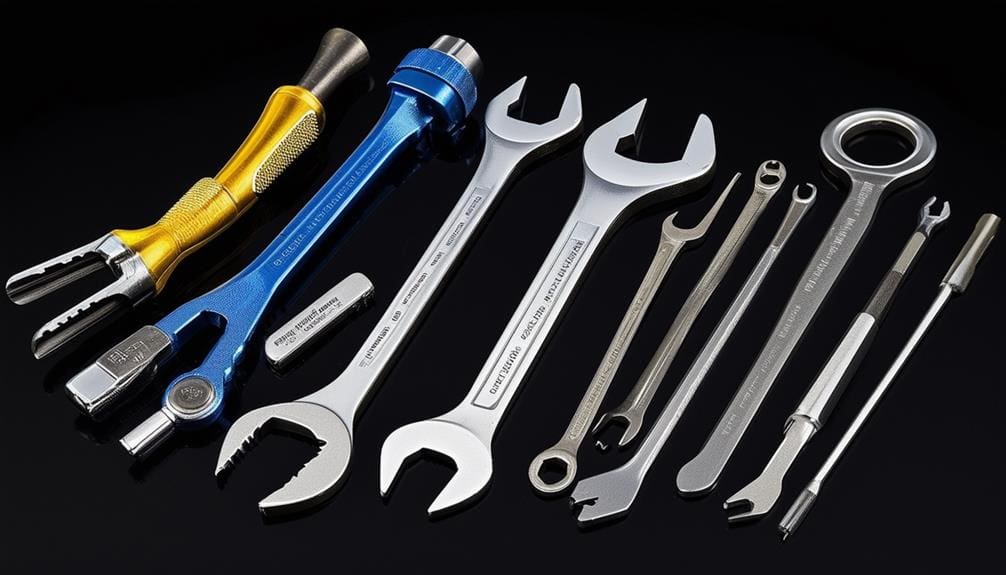
When you choose professional-grade tools from LockPickWorld, you’re opting for all-encompassing options that cater to various car models and lock types. These tools offer unparalleled versatility and compatibility, ensuring you’re prepared for any challenge. Made from durable materials like stainless steel, they promise quality and longevity, making them a reliable choice for both professionals and enthusiasts.
Comprehensive Tool Options
For those seeking professional-grade tools, the extensive options available in the Master Auto lock pick set (Code: LT-340) provide everything needed to effectively compromise vehicle locks. This set includes 17 meticulously crafted lock-picking tools designed to tackle a variety of car locks. Each tool, such as the LT-300, LT-310, LT-320, LT-330 tension wrench, and the 106 gas cap pick tool, serves a specific purpose, ensuring you’re well-prepared for any lock-picking scenario.
Constructed from sturdy and durable materials, these tools are built to withstand frequent use, making them a reliable choice for professionals. The custom leatherette case not only adds a touch of sophistication but also guarantees easy carrying and safe storage, keeping your tools organized and protected.
Moreover, the Master Auto lock pick set is supported by excellent customer service. You’ll appreciate the toll-free order placement assistance, fast shipping, and a money-back guarantee on defective products. These features collectively enhance your overall experience and satisfaction with these professional-grade tools.
Versatility and Compatibility
LockPickWorld’s high-quality auto lock pick sets are well-known for their unmatched versatility and compatibility with a wide array of car models. These lock picking tools are carefully crafted to meet the needs of locksmiths and automotive professionals, providing you with the ability to tackle various car locks efficiently.
One of the key features of LockPickWorld‘s offerings is their extensive range, including tools like wafer lock rakes and Lishi 2-in-1 car lock picks. These tools allow you to master car lock picking effortlessly, regardless of the vehicle make or model you come across. For example, the Ford Tibbe Premium Lock Pick and Decoder Tool is specialized for Ford vehicles, ensuring accuracy and efficiency.
LockPickWorld’s selection also includes the Honda HON66 Rake and Pick, a tool specifically designed for Honda cars. This showcases the variety and specialized nature of their product line, catering to different car brands and lock mechanisms. By selecting these professional-grade tools, you can be confident in your ability to handle a wide range of automotive locks, improving your skills and success in the industry.
Quality and Durability
Guaranteeing the highest quality and durability, professional-grade auto lock pick sets like the Master Auto lock pick set (Code: LT-340) are designed to withstand rigorous use and deliver consistently reliable performance. With 17 picks specifically tailored for compromising vehicle locks, this set is an essential tool for any professional locksmith. Each component, including the LT-300, LT-310, LT-320, LT-330 tension wrench, and the 106 gas cap pick tool, is crafted from sturdy, durable materials, ensuring longevity and repeated use without degradation.
The tools in the Master Auto lock pick set are made from superior quality stainless steel, providing both comfort and effective results. This high-grade material resists wear and tear, making it ideal for the demanding tasks a professional locksmith encounters daily. Additionally, the set comes in a custom leatherette case, offering convenient carrying and safe storage, which further safeguards your investment.
Lockpickshop, the provider of this set, guarantees fast shipping, with packages arriving within 2-5 days in the continental US. They also offer a money-back guarantee on defective products, giving you peace of mind about your purchase. When you invest in the Master Auto lock pick set, you’re choosing tools that promise quality and durability.
Preparing for Lockouts
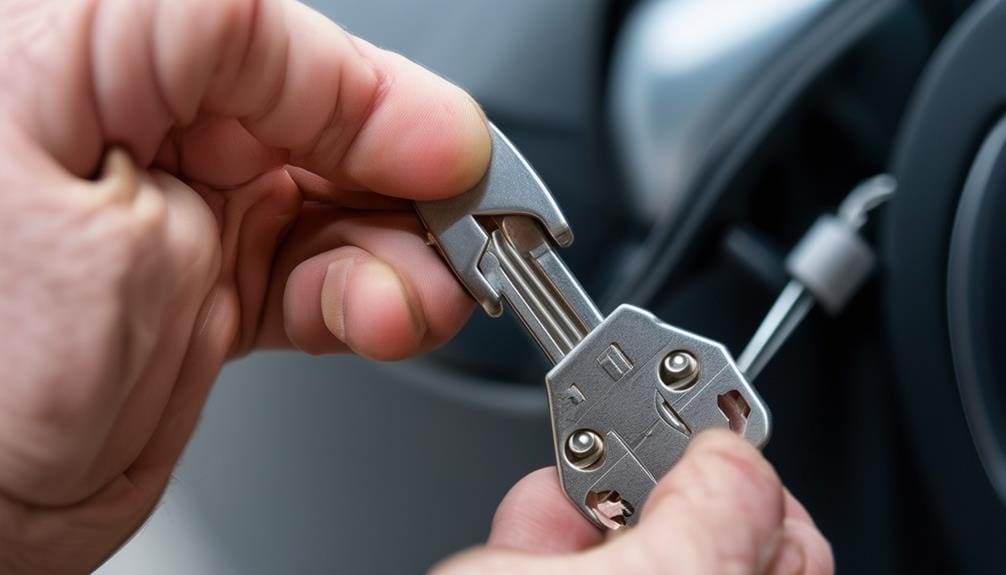
Being prepared for car lockouts means having an auto lock pick set ready to handle unexpected situations efficiently. When you’re locked out, having the right tools can make all the difference. Specifically, a set designed for car doors will guarantee you can address the unique mechanisms found in automotive locks. Standard lock picking tools won’t suffice for this purpose; you need specialized equipment.
First, make sure you have a complete auto lock pick set before you face a lockout. This preparation avoids the frustration and inconvenience of being stranded. Browse SouthOrd’s full line of automotive and car lock picking kits, which offer a variety of tools suited for different car models and lock types. Each kit is designed to help you navigate the intricacies of car door locks effectively.
Moreover, it’s essential to understand how to use these tools correctly. Familiarize yourself with each component of your lock pick set to maximize efficiency during an actual lockout. For any inquiries about which car lock picking kit is right for you, don’t hesitate to contact SouthOrd. This guarantees you have the right tools on hand and are fully prepared for any lockout scenario.
Legal Considerations

When considering an auto lock pick set, you need to be aware of regional legal variations, as laws differ substantially. Possession is often linked to intent, so understanding the guidelines for professional locksmiths in your area is essential. Make sure to stay informed about your local regulations to avoid any legal complications.
Regional Legal Variations
Understanding the diverse legal terrains concerning lock pick sets is important for both hobbyists and professional locksmiths to avoid potential legal issues. Possession legality varies significantly by region, and it’s essential for lock pickers to stay informed about local regulations. For instance, states like Mississippi and Nevada have specific conditions governing the possession of lock pick sets. Ignorance of these laws can lead to unintended legal complications.
To help you navigate these regional variations, here’s a concise breakdown:
| Region | Legal Status | Notes |
|---|---|---|
| Mississippi | Conditional | Legal with locksmith license or proof of intent. |
| Nevada | Conditional | Legal if used for professional purposes. |
| Other States | Varies | Check local laws for specific regulations. |
LockPickWorld prioritizes meeting your lock pick set needs while ensuring adherence to legal requirements. Whether you’re a hobbyist or a professional locksmith, staying informed about the legalities in your region is non-negotiable. Understanding these regulations will not only keep you compliant but also protect you from unnecessary legal troubles. Always research and verify the legality of lock pick set possession in your area before making a purchase or engaging in lock picking activities.
Possession and Intent
To legally possess lock picks, you must understand the intent behind their use and how regional laws interpret that intent. Possession of lock picks can be illegal in certain regions, so knowing the local regulations is vital. In some US states like Mississippi and Nevada, specific laws govern the possession of lock pick sets. Typically, the law evaluates whether your intent aligns with lawful activities such as locksmithing or hobbyist interests.
Understanding these legal nuances is important. If your intent is deemed malicious, possessing lock picks can lead to legal consequences. LockPickWorld, a reputable provider, ensures compliance with legal requirements while offering tools for enthusiasts and professionals. However, the responsibility remains on you to stay informed about regional regulations.
Professional Locksmith Guidelines
As a professional locksmith, you’re responsible for not only mastering your craft but also making sure that you adhere to all legal requirements regarding the possession and use of lock picks. Legal considerations around lock pick sets vary widely by region, and understanding the specific laws in your area is vital to avoid any legal complications.
In the United States, for example, states like Mississippi and Nevada have specific regulations that govern the ownership of lock pick sets. These laws often depend on the intent behind possessing such tools. If you’re using them for legitimate professional purposes, you’re typically in the clear, but it’s important to stay informed and compliant.
LockPickWorld is a reliable resource that guarantees compliance with legal requirements while catering to your lock pick set needs. They offer tools that meet regional regulations, helping you maintain your professional integrity.
Whether you’re a hobbyist or a professional, staying informed about the legality of owning lock picks is a must. Understanding regional regulations is vital for avoiding legal issues and maintaining your reputation. Always research and verify the laws in your area before purchasing or using any lock pick set.
Top Lock Pick Sets
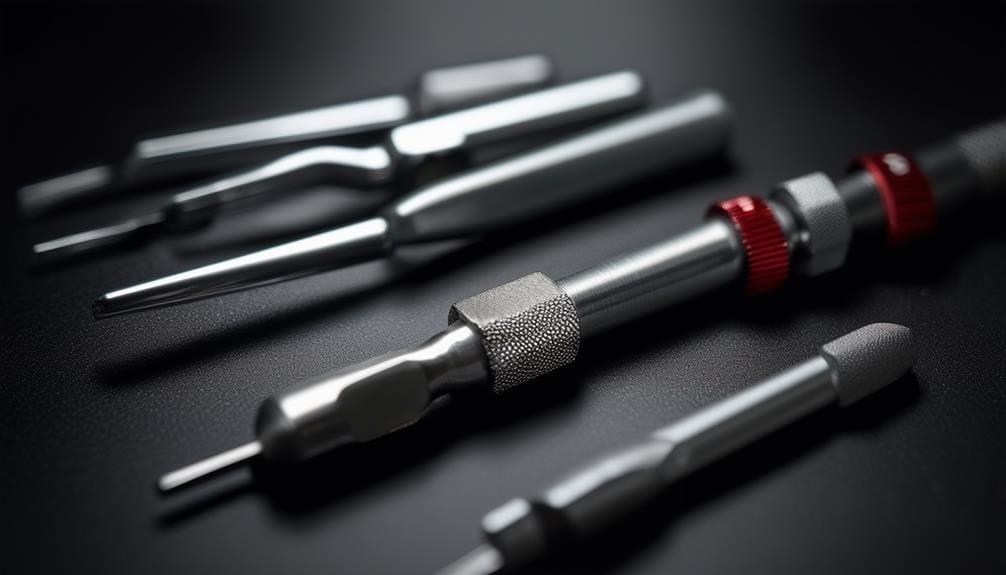
LockPickWorld’s top lock pick sets, featuring brands like Dangerfield and SouthOrd, cater to both beginners and seasoned professionals, guaranteeing you have the right tools for any lock-picking challenge. These sets are meticulously crafted to provide you with the necessary tools for handling a variety of locks. Whether you’re just starting or looking to expand your expertise, you’ll find suitable options at LockPickWorld.
Dangerfield sets are renowned for their durability and precision, offering an all-encompassing range of picks and tension tools. SouthOrd, another trusted name, delivers high-quality picks that combine reliability with ease of use. For those just beginning, LockPickWorld offers beginner sets that include guides and instructional videos to help you develop your skills methodically.
Multipick and Sparrows also stand out for their innovative designs and performance in real-world scenarios. Reviews from customers highlight the effectiveness and quality of these tools, making it easier to make an informed decision. With over 10 years of trusted service, LockPickWorld guarantees quality and affordability, offering free US shipping on orders above $35.
Choosing the right set involves understanding your needs and matching them with the features of these top-rated tools.
Frequently Asked Questions
What Is the Best Lock Against Lock Picking?
To guard against lock bypassing, choose high-security locks like Medeco or Mul-T-Lock. These locks feature security pins, false gates, and sidebar mechanisms. For ultimate protection, consider electronic locks with biometric scanners and ANSI/BHMA certification.
What Lockpicks Do Locksmiths Use?
You’ll find locksmiths using high-quality stainless steel picks and tension wrenches. They select tools based on the variety of car locks they encounter, ensuring their lock picking techniques are precise and effective for different lock mechanisms.
What Is the Most Universal Lockpick?
When it comes to lockpick technology, the Lishi 2 in 1 Car Lock Picks are the cat’s meow. They’re versatile, compatible with various foreign and domestic models, and offer excellent performance for different car lock types.
What Is the Hardest Master Lock to Pick?
The hardest Master Lock to pick is the Master Lock 570. Its complex internal mechanisms, including spool and serrated pins, require advanced lock picking techniques, making it a formidable challenge even for experienced lock pickers.
Conclusion
Imagine you’re a modern-day locksmith knight, armed with the finest tools to conquer any automotive fortress. By understanding car lock types, selecting essential tools, evaluating product ranges, and mastering specialized picks, you’ll be prepared for any lockout. Remember, with great power comes great responsibility—adhere to legal guidelines. Invest in top lock pick sets, and you’ll open not just car doors, but a world of possibilities. Now, go forth and master your craft.

